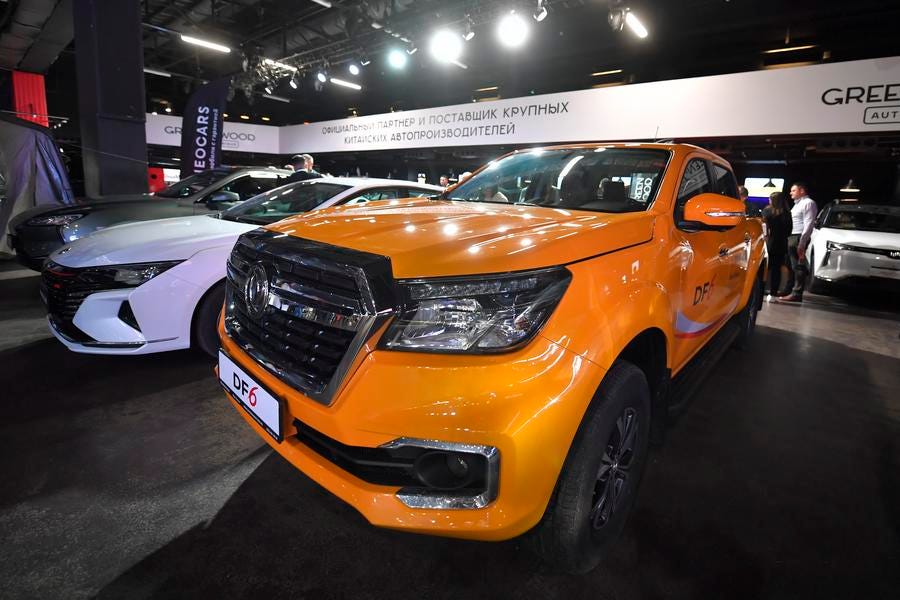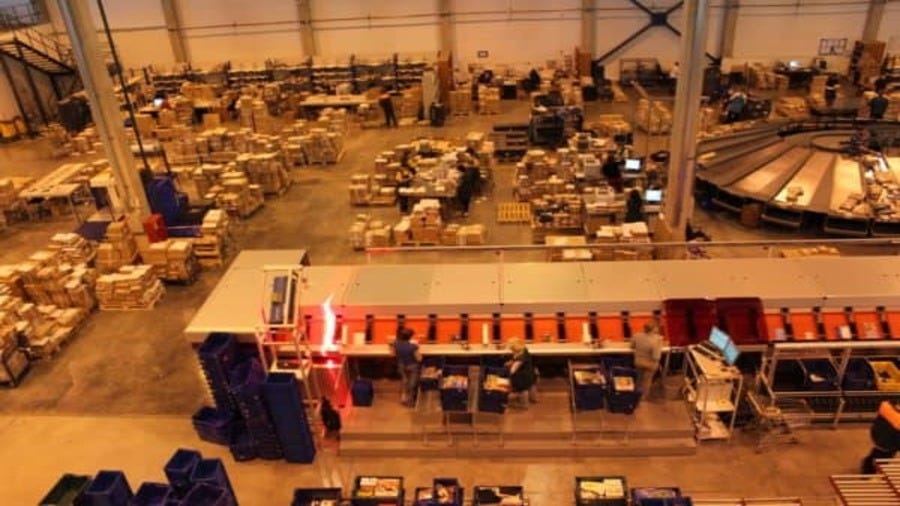It seems Russians are finally coming face-to-face with the limits of the ‘NO LIMITS’ strategic partnership with China as well as hazards of doing business with the Chinese enterprises. Reports have emerged of growing frustration within the Russian business class over the difficulties of doing business with China.
The most prominent of these reports is the one published by the pro-Kremlin Russian daily, Izvestia, in early August, according to which, around 98% of Chinese banks are refusing payment transfers from Russia, both in the Chinese yuan and the Russian Ruble, due to the fear of US’ secondary sanctions targeting financial institutions that were helping Russia.
Alexey Razumovsky, the commercial director of payments company Impaya Rus, told Izvestia that these payment challenges with Chinese banks could cause supply chain disruptions and inflation in Russia.
The issue of financial transactions was said to be high on the agenda of the Russian President Vladimir Putin’s visit to China in May, and while there were some measures undertaken after this high profile visit, such as using small, regional Chinese banks that could go undetected by the US sanctions radars, payment issues still remain. Moreover, the Chinese companies are also refusing payment from the Russian bank branches in China.

All this has begun to affect Russia’s trade with China, which is essential to supporting the Russian war effort in Ukraine. While Russia’s exports to China help finance its wartime economy, its imports of Chinese industrial goods like the high-precision CNC (computer numerical control) machine tools produced by companies reportedly linked to China’s People’s Liberation Army (PLA), are more important for sustaining its war effort.
China’s official statistics show that Russia’s imports from China declined by more than 1% to US$62 billion from January to July because of the payment problems and this has created problems for Russia’s industrial sector, per a research co-authored by Kirill Babaev, head of the China Institute at the Russian Academy of Sciences.
“In today’s situation, payment problems with Chinese banks particularly exacerbate this challenge, as there are no other major suppliers of many types of industrial equipment besides China at present,” Babaev’s research paper that was published in the previous month stated.
As author had pointed out in his earlier article, majority of China’s exports in 2022 as well as in 2023 went to the countries with which it has very tense bilateral relationships such as the US, which has been the largest importer of Chinese goods so far, followed by Japan, South Korea, Vietnam and India, etc.
This means that while trade with China is critical for Russia to weather the Western sanctions and sustain its war effort in Ukraine, China has to be mindful that economic cooperation with Russia does not affect its other trade interests in the West and the Indo-Pacific which is more important for its export driven economy.
Therefore, Russia and China are contemplating complex measures to try and continue bilateral trade and payments by circumventing restrictions imposed by the US sanctions. For instance, the two countries could conduct deliveries and transactions through “friendly” third-party countries, and per a recent Reuters report citing unnamed sources, some Russian businesses are already using intermediaries in third countries to process their transactions and circumvent the compliance checks run by Chinese banks.
However, there are challenges associated with this method too, such as an increase in the cost of processing transactions to as much as 6% of transaction payments, from nearly zero before involving the third party intermediaries, Reuters reported citing unnamed sources.
Moreover, financial institutions in countries friendly to Russia are also said to have begun refusing Russian payments after the US President Joe Biden signed an executive order on secondary sanctions in December 2023. Latest instance of this is the refusal of Russian payments by banks in the United Arab Emirates (UAE), as reported by Kommersant, a Russian daily newspaper, on August 28.
In early August, the Emirati banks began blocking Russian payments for Chinese equipment being delivered directly from China to Russia. However, according to Russian ‘market participants’ cited by BFM.ru, a Russian business news website, it is China that has initiated this blocking due to the fear of secondary US sanctions. Chinese banks are reportedly asking for data on the origin of incoming funds and a customs declaration from organizations in Dubai.
Likewise, BFM.ru reported that even Turkey and a couple of Central Asian countries have also begun refusing payments from Russia.
That said, China and Russia appear to be committed to maintaining bilateral trade, and there are also reports of good old-fashioned barter trade being discussed by the government of the two countries as a way to get around Western sanctions.
However, there are other problems emerging in the Sino-Russian bilateral economic relationship that have nothing to do with the Western sanctions.
Imports Of Cheap Chinese Goods Are Hurting Local Russian Businesses
Of late, many Russian industrialists have been complaining about the Russian market being flooded by cheap industrial goods from China. Among these industrialists is Maxim Sokolov, president of a major Russian automobile company AvtoVAZ, who in a press statement in April stated that Chinese brands are not interested in localizing their cars in Russia and are pursuing aggressive expansion.
“Unfortunately, we continue to observe extremely aggressive price expansion on the part of imported cars of Chinese brands, which are not interested and do not see any incentive in localizing their production in Russia, which would load the Russian component industry with additional orders,” said Sokolov.
Following the withdrawal of western manufacturers from Russia after its invasion of Ukraine, Chinese car manufacturers, consumer-electronics producers and other manufacturing enterprises have been left with a near monopoly over the Russian market.
In 2023, Chinese automakers sold a total of 553,000 cars in Russia, accounting for 49% of the Russian auto market. In 2024, this market share is estimated to reach 60%, according to the president of the Russian Automobile Dealers Association (ROAD) Alexey Podshchekoldin.

Shortly after Sokolov’s remarks, Sergei Chemezov, the CEO of Rostec, a Russian state-owned conglomerate, also called for limiting the number of Chinese cars on the Russian market.
“Here, some restrictions need to be made by the government anyway. There is no other way,” Chemezov said in an interview with RBK, a Russian business newspaper, when asked about the issue of surplus of Chinese cars on the Russian market and its impact on the sales of Russian automakers.
Similar concerns have emerged in other sectors of the Russian industry. In the heavy engineering sector, for example, local Russian oil and gas engineering equipment producers are facing tough competition from Chinese manufacturers.
Majority of purchase orders from Russian enterprises in the fuel and energy complex (FEC) are given to the Chinese contractors, according to Nikita Voronin, Sales Director of Npo Natek-Neftekhimmash ZAO, a Russian heavy engineering company, who noted that Chinese contractors are able to sell their equipment at half the prices of those set by Russian manufacturers.
Also, despite their low cost, Chinese equipment is not inferior to the Russian ones, and sometimes is even at a comparable level to the European and American ones. Moreover, the analogues of Russian developed equipment are also being imported from China at cheaper rates. This is made possible due to the huge support the Chinese equipment exporting companies receive from the government in the form of tax and credit benefits, as well as various subsidies.
Furthermore, there is another rather expensive dimension to this cheaper Chinese-made equipment that Voronin pointed out in an interview with a Russian media outlet, citing the example of Uzbekistan, which also purchased all its fuel and energy equipment from China, and when the time came for the repair and servicing of this equipment, Chinese contractors raised their prices sharply.
Gennady Masakov, an expert on oil and gas sector who heads the analytical center at Yakov and Partners, a Moscow-based consulting firm (formerly McKinsey in Russia), explained to a Russian media outlet that servicing Chinese equipment can be more expensive than Western equipment due to lack of skills to work with it and the need to actively involve representatives of manufacturing companies to carry out repairs, including transportation to China.
That said, the Russian government is working toward increasing the share of indigenous equipment used in the oil and gas sector. The Russian Ministry of Energy expects the level of independence of the industry to grow up to 65% by the end of 2024, up from 62% in 2022.
Unethical Business Practices Of Chinese Enterprises
Several Russian entrepreneurs have also voiced grievances about the unethical business practices adopted by their Chinese competitors to sell their products on Ozon, an online marketplace, sometimes referred to as ‘the Amazon of Russia’.
On Ozon, Chinese sellers are not just competing with the help of lower prices but also by counterfeiting Russian brands. Konstantin Belyaev, Director of Marketing and Dealer Sales at Brodeks, a technological workwear making company, told a Russian media outlet in April that many Chinese sellers were copying product photos from Russian sellers, and often even entire product cards that give information about the products to the customers.
“They simply took our entire collection of photos, somehow registered, created product cards, reduced prices, for example, by 20% and with a waiting period of plus one month offer buyers to buy our products, under our brand,” Belyaev was cited as saying by BFM.ru. The only way to figure out that the product is not in Russia is through a small inscription on the product card stating that it is delivered from abroad.
Other than counterfeit products, technological cloning by Chinese enterprises is also becoming a challenge for Russian businesses, as brought out by Pavel Vodyankin, the CEO of Perfecto Group that sells electronics.
“This is not just my personal story, this is probably the story of almost all sellers on Ozon. The platform actively launched the Chinese on the Russian market, gave them some preferences. The Chinese automatically, through a program or something, simply clone all the intellectual property, lower the price a little, and that’s it. I’m not the only one, there are thousands of people, there are general chats, you name it, there are tens of thousands of requests, Ozon gives template answers, just formal replies – and that’s it,” Vodyankin is cited as saying by BFM.ru.
Ozon Global opened a representative office in the Chinese city of Shenzhen in Guangdong Province in late 2022 to attract Chinese sellers. A total of 12,000 sellers were registered on the e-commerce platform at the time, and around 10,000 of them were Chinese.
By the end of 2023, the number of Chinese sellers on Ozone surpassed 100,000. At present the site is said to have around 500,000 registered sellers, meaning one in every five sellers on Ozone is Chinese. All this has negatively impacted the Russian sellers who are finding their products falling down in the search results with Chinese clones taking the top position.
Not only is this resulting in declining sales for the Russian sellers but also a damage to their reputation in cases where their product cards are stolen by the Chinese sellers, as buyers dissatisfied with the quality of goods arrived from China leave negative reviews to the Russian sellers and not the Chinese ones.
At present, the only factor helping the Russians compete with the Chinese sellers is the longer delivery time taken by Chinese products to reach the end consumer compared to the Russian ones due to the ability of Russian sellers to place their products in all or most of the Ozon warehouses. However, this could soon change.
Wildberries, the largest online retailer in Russia, in its bid to attract Chinese sellers, has given them the opportunity to store goods directly in its warehouses. So, this might fuel the competition, resulting in Ozon doing the same for Chinese sellers.
Overall, the Russian sellers find themselves in a very difficult position with online marketplaces trying to attract Chinese sellers to increase their volume of cross-border sales. For instance, the Chinese sellers account for more than 90% of cross-border trade on Ozon, whose representatives deny any competition to the Russian sellers from the Chinese ones.
Not even the Russian government, it seems, is sympathetic to the grievances of Russian entrepreneurs, going by the remarks of the head of the e-commerce council of the Russian Chamber of Commerce and Industry, Alexey Fedorov, who denied any impact of the Chinese sellers on Ozon on the Russian sellers when asked about this issue. “The appearance of Chinese sellers on Ozon did not affect Russian sellers,” Fedorov was quoted as saying in June by Vedomosti, a Russian business daily.
The Truth Of ‘NO LIMITS’ Partnership
As stated earlier, problems in bilateral payments have begun to negatively impact the trade between Russia and China, which could probably bring some measure of relief to Russian businesses, at least until the governments of the two countries are able to address this issue properly.
According to Vasily Kashin, who heads the Center for Comprehensive European and International Studies at the National Research University Higher School of Economics, it may take some months to completely circumvent the secondary US sanctions but there is hope of additional payment channels emerging by next year.
“Apparently, it will take more months to completely overcome the consequences of the escalation of sanctions, which began at the beginning of the year. But there is hope that additional channels for making payments will appear, and delays will decrease. The Americans will counter this by introducing new sanctions. But still, given the presence of branches of banks of the two countries working in national currencies, and taking into account other planned measures, it is likely that by next year we will have a system that will be protected, which the Americans will not be able to influence,” Kashin told BFM.ru.
However, the larger observation here is the extent to which Russia is kowtowing to China, and how despite this kowtowing, the latter has not been very forthcoming. For instance, it was reported by the Financial Times (FT) in June, citing unnamed sources, that negotiations between Russia and China on the ‘Power of Siberia 2’ gas pipeline deal have hit the snag due to the latter’s unreasonable demands on price and supply levels.
This pipeline, which was planned to transport a maximum annual capacity of 50,000,000 m³ of natural gas from Russia to China, is said to be critical for Gazprom, Russia’s state-owned energy company that has been bleeding cash after losing a major chunk of the European market due to Russia’s invasion of Ukraine in 2022. Last year, the company reported a loss of US$6.9 billion, marking the first annual loss in the last 20 years.
China is said to have demanded to pay for the natural gas at rates very close to Russia’s heavily subsidised domestic prices. Now, before the war in Ukraine, Gazprom relied on its gas sales to Europe at high prices to supply the Russian domestic market at subsidised rates, so if it accepts the Chinese demand, domestic gas prices will have to be increased, adding to the woes of Russian wartime economy which is already grappling with inflation.
Moreover, China wants to commit to buying what is described as only “a small fraction of the pipeline’s planned annual capacity of 50bn cubic metres of gas,” by the Financial Times report. Apparently, Beijing, while being cognizant of Russia’s importance to China’s energy security, is also mindful of the risks associated with over-reliance on any one country for energy supplies, especially Russia, considering how Moscow had tried to weaponize the Nord Stream gas pipeline to pressure Europe over Ukraine.
The Russian economist Vladislav Inozemtsev, who is the director of the Moscow-based nonprofit think tank, Centre for Research on Post-Industrial Societies, alluded to this in a recent interview with Novaya Gazeta while pointing out that Russia is currently the largest energy supplier for China.
“That is, Russia is already the largest player in China’s energy market, it supplies approximately one-fifth of both oil and oil products and gas, so in this sense China is more dependent on Russia than on other countries. And I do not think that it seeks to increase this dependence even more, this contradicts the traditional Chinese approach,” Inozemtsev continued.
Also, in the long run, China is looking to curtail its hydrocarbon consumption by transitioning to the use of green energy, which is poised to reduce its reliance on hydrocarbon imports, including from Russia. Therefore, prospects for the ‘Power of Siberia 2’ gas pipeline deal between China and Russia are not looking good.
However, experts such as Alexander Gabuev, the director of the Carnegie Russia Eurasia Center in Berlin, suggest that Beijing may still want to enter into the pipeline deal with Russia to secure a source of gas supply not based on maritime routes that would be affected in case of a maritime conflict around Taiwan or the South China Sea, and Moscow will have no choice but to accept Chinese demands due to the lack of another overland route for its gas exports.
Basically, there certainly are limits to this so-called ‘NO LIMITS’ Sino-Russian strategic partnership, and currently it is China who is deciding where those limits are with Russia seem to be having no say in it at all. Or, another way of putting this is, that this ‘NO LIMITS’ partnership applies only to China’s demands from Russia.
So, as the author had suggested in his previous article five months ago, what may have seemed to Russia as China’s embrace earlier, has now ended up becoming a noose around its neck, with Russian businesses, including state-owned gas giants like Gazprom, beginning to feel the squeeze of it.
Tanmay Kadam is a geopolitical observer based in India. He has experience working as a Defense and International Affairs journalist for EurAsian Times. He can be contacted at tanmaykadam700@gmail.com





